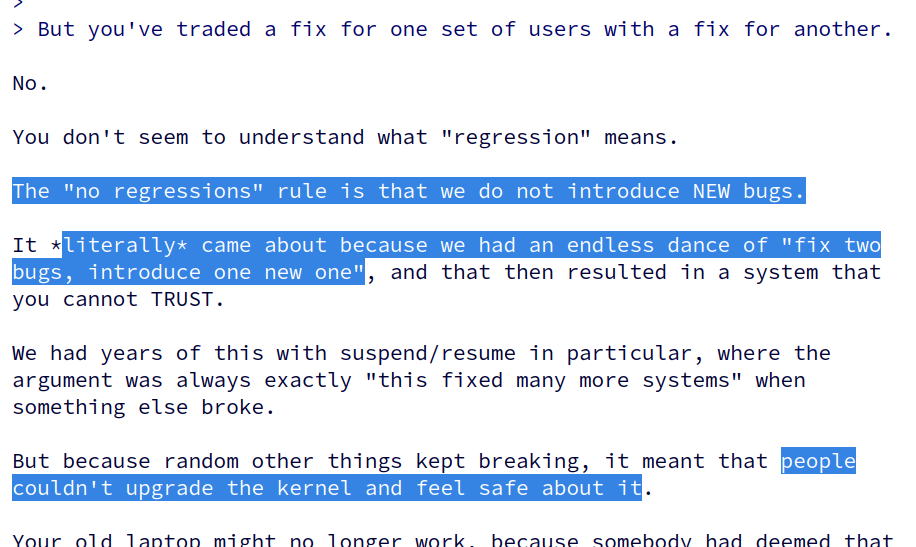Posts
5078Following
331Followers
504OpenPGP: 3AB05486C7752FE1
lwnbot
lwnbot@c.imA plea for more thoughtful comments https://lwn.net/Articles/975597/ #tech #linux
Thorsten Leemhuis (acct. 1/4)
kernellogger@fosstodon.orgEver wondered why @torvalds coined the #Linux #kernel's "no regressions" rule? He just explained it again here: https://lore.kernel.org/all/CAHk-=wgtb7y-bEh7tPDvDWru7ZKQ8-KMjZ53Tsk37zsPPdwXbA@mail.gmail.com/
'"[…] I introduced that "no regressions" rule something like two decades ago, because people need to be able to update their kernel without fear of something they relied on suddenly stopping to work. […]"'
Follow the link for context and other statements that did not fit into a toot.
Jarkko Sakkinen
jarkkoAnd also, for instance with this fresh bus encryption feature for TPM chips, despite getting only a single performance regression report from a private user so far, I scaled "default y" down to "default X86_64" because that is the only platform where I've been able to test it successfully even with an old Intel Celeron NUC.
I would also emphasize this as a maintainer: even if the new feature is exciting, scale it down *eagerly* before it hits a release. It is always easier scale up later on, than scale down. I tend to label "uncertainty" as a regression despite not having better knowledge rather than "wait and see". I'd label any other behavior as pure ignorance: you knew that shit might hit the fan but did absolutely nothing.
Jarkko Sakkinen
jarkkoEmailed to TCG:
Forwarded message from Trusted Computing Group on Wed May 29, 2024 at 1:58 PM:
Message Body:
Some views on topic I've written:
- https://social.kernel.org/notice/AiNuw35YY9uOSrhiK0
- https://github.com/wolfSSL/wolfTPM/issues/356
Linux kernel patch set ongoing which made me realize that p256k1 is lacking from your registry:
- https://lore.kernel.org/linux-integrity/20240528210823.28798-1-jarkko@kernel.org/
This really should exist despite not being the most secure ECC given the compatibility to a number o
f open source projects and platforms (not just ETH and BTC). Please read also the above links, the w
rite ups are short and to the point. This would add by factors the importance of TPM2 ecosystem spre
ading to new applications.
--
This e-mail was sent from a contact form on Trusted Computing Group (https://trustedcomputinggroup.o
rg)
On possibility of adding TPM_ECC_SECP_P256_K1 curve to https://trustedcomputinggroup.org/wp-content/uploads/TCG-Algorithm-Registry-Revision-1.34_pub-1.pdf
Jarkko Sakkinen
jarkkoI think after TPM2 RSA/ECDSA work lands to mainline, I'll make software implementation of p256k1 ECDSA verification, and some time later, signing. That way at least TPM2 keys can root a key hierarchy for p256k1 keys to the Linux keyring, despite being just software implementation.
Stefan Berger has done during last 2-3 years a decent ecc_* API so should not be even a huge stretch.
So tpm2_key_ecdsa (if I did not overlook anything, cannot be 100% sure) might even enable ECDSA signing overall for Linux kernel for the first time.
#linux #kernel #keys #keyring
Jarkko Sakkinen
jarkkoJarkko Sakkinen
jarkkohttps://trustedcomputinggroup.org/resource/tcg-algorithm-registry/
#TPM #blockchain
Jarkko Sakkinen
jarkkoJarkko Sakkinen
jarkkoThis is the first version with fully working #ECDSA signing and signature verification with the public key.
Implementation notes:
- Accepts only sha256 at this point. Can be easily extended later. It is best overall choice for the first version.
- Does not accept any authentication policy yet. Can be extended later by adding a new parameter to
match_table_t param_keysinsecurity/keys/keyctl_pkey.c. E.g."policy=%s".
I’m pretty happy with this, given that I did it fully during 1.5 week period on my free time and unpaid ;-)
Jarkko Sakkinen
jarkkoMarcin Juszkiewicz 🙃
hrw@society.oftrolls.comLinux 6.10-rc1 got released yesterday. With brand new `mseal()` system call.
So my automation kicked in, posted pull request, I merged, page with system calls table got rebuilt:
https://gpages.juszkiewicz.com.pl/syscalls-table/syscalls.html
Jarkko Sakkinen
jarkkoJarkko Sakkinen
jarkkoThe new version includes also sub-type for ECDSA signing and verification.
#linux #kernel

